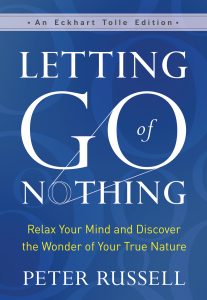
Letting Go of Ego
An excerpt from Peter Russell’s
Letting Go of Nothing: Relax Your Mind and Discover the Wonder of Your True Nature
The ego we should let go of is not what psychologists call a “healthy ego,” a sense of self-worth important for full psychological development that helps us form meaningful relationships and cope with the challenges of life, but the self-centered mode of thinking that assumes happiness depends on what we have or do, leading us to use the world for our own ends.
There are, needless to say, times when this approach is important. If our well-being or safety is at risk, it’s completely natural to make our personal welfare a priority. Egoic thinking, as such, is not an enemy. It is an ally, there to help us survive.
The downside arises when this mode of thinking is activated more than necessary. It hijacks our attention, creating discontent when none is needed, triggering emotions we’d be better off without, obsessing over getting what we think will make us happy, solving problems that don’t yet exist and may never come to pass — all of which overshadows our experience of the present moment, veiling the peace and contentment of the natural, unperturbed mind.
Seeing ego as a way of thinking we get caught in — we could call it ego-mind — rather than some thing we need to control or eliminate makes the task of freeing ourselves from its grip much easier. When we notice egoic thoughts arising, we can simply choose not to follow them.
Yet, as most of us can testify, it is seldom that easy.
For a start, the ego-mind can be active so much of the time it seems normal. If you wear rose-tinted spectacles all the time, you forget what the world looks like without them. Similarly with the ego-mind: its view of reality can easily become the “truth.” If, for example, you hold a certain mindset about your national leader, it can become the reality through which you interpret his or her actions, making it very challenging for someone to make you change your mind.
In addition, egoic thinking wants to be taken seriously. It has a job to do: keeping us safe. If our well-being is truly at stake, it needs us to follow its planned course of action. The fact that the same response can be triggered by some imagined threat is irrelevant. Once triggered, it is up and running, demanding we follow its bidding.
This insistence can be a clue to spotting when we are caught in egoic thinking. When the voice in your head seems particularly strong, persuading you of the right thing to do and not wanting to hear alternatives, it might be time to pause and consider whether ego-mind might be in full swing. Step back for a moment, notice what the voice is saying, and consider how true that is.
Another way of recognizing egoic thinking is the background mental tension that can accompany it. Much of the time, this tension is so faint we don’t notice it. But we may occasionally sense it as a slight tightening or constriction in the mind. It comes from two sources. First, focusing our attention on some idea or issue that seems important can take a small unconscious effort, resulting in a slight mental tension. Second, most of our egoic thoughts have an element of discontent, contributing further to the tension.
This faint mental tension is the hallmark of the ego. So when you notice it, allow your attention to relax, and explore whether you might be caught in some egoic pattern of thought. And if so, inquire whether there might be another way of seeing things.
But be careful: ego-mind is not open to seeing things differently. It thinks it knows what is right and cannot see beyond its own mindset to a radically different point of view. We must get help from a different quarter, from the part of us that remains untouched by the voice of the ego. We need to let in the wisdom of the untainted mind.
Peter Russell, author of Letting Go of Nothing and From Science to God, earned degrees in theoretical physics, psychology, and computer science at the University of Cambridge in England, where he studied for a time with Stephen Hawking. He studied meditation and Eastern philosophy in India and later conducted research into the neurophysiology of meditation. He coined the term global brain with his 1980s bestseller of the same name (100,000 copies sold), in which he predicted the internet and the impact it would have on humanity. He lives in Northern California. Connect with Peter at www.PeterRussell.com.
Excerpted from the book Letting Go of Nothing. Copyright © 2021 by Peter Russell. Reprinted with permission from New World Library.
